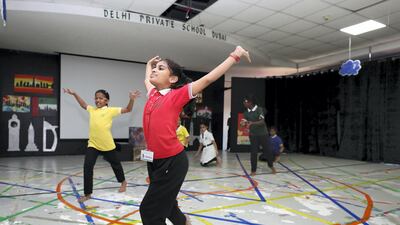More schools in Dubai are looking at flexible education to help pupils gain real-life work experience or follow their dreams.
The Knowledge and Human Development Authority has seen a barrage of requests from schools with proposals to alter their current system and infuse innovation into school-life.
The Indian High School in Dubai announced in January that starting from April, 1,200 Grade 11-12 pupils will get a day and a half off every week to pursue hobbies.
The programme is part of Rahhal, the KHDA's personalised education initiative, which aims to provide an innovative alternative to mainstream education. The initiative is part of 10X, the Dubai Future Foundation’s plan to achieve 10 years’ worth of development over the next two years.
Hind Al Mualla, chief of creativity, happiness, and innovation at the KHDA said schools have been showing keen interest in taking a more unconventional approach to education.
The school regulators have received proposals aimed at younger grades, even pre-school and kindergarten.
"We received a lot of inquiries and requests from different schools with possibilities," she said.
"We want to empower and enable learners by letting them learn whatever they want to, wherever they want — learning does not have to happen in a classroom. This is an enabling platform where all sorts of innovation can take place.
The KHDA is also seeing a rise in interest from parents, and will be holding monthly open days so people can interact and generate ideas.
Ms Mualla believes schools can use Rahhal to infuse innovation into their daily practices.
She said that Indian High School is enabling high school pupils to get a menu of choices.
"Change is always good and one should not ignore new trends," said Rashmi Nandkeolyar, principal of Delhi Private School Dubai, which has signed up to the Rahhal initiative.
"Finland has shown that alternative methods of education do work. You can see the shift in education," she said.
"The fact that the KHDA and schools are looking at this is laudable.

Ron Hodkinson, principal of Ontario International Canadian School, said that if pupils have an interest and they are getting real-life experience, then the "benefits are huge".
"But, are they ready to make those decisions when they are 14?" he said.
"I give them (the Indian High School) credit for trying it and as educators, we have to evolve with our pupils.
He also said, however, that this sort of approach calls for caution as there are things to be considered, such as the fact that while some pupils need more social interaction others are more academically focused.

His school is working to personalise education in its own way — homework has been relabelled 'home learning' and every child is assigned individualised work based on areas where the pupil might be struggling.
Michael Worth, International Baccalaureate Career Programme Co-ordinator at Greenfield Community School, said he relished the chance to give children time off and currently has two pupils spending one day a week in a work placement.
"I have always wondered why we keep pupils at school for so many hours. They get exhausted and we keep feeding them information, but they need to get out of the classroom," he said.
Although his school is not planning to take part in flexible learning on the whole, they are hoping to make it work for individual pupils.
"The education map is changing dramatically. Universities and employers are requiring more life skills," he said.
"I think the programme is revolutionary and innovative — I applaud the Indian curriculum schools for looking at different ways.


